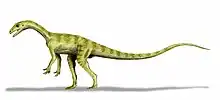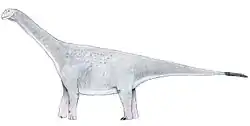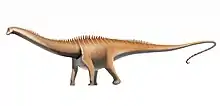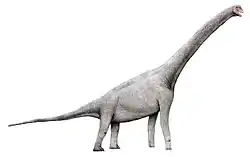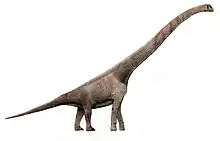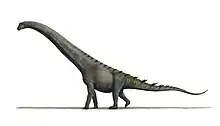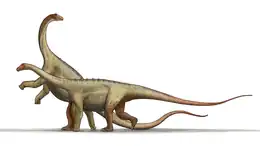| Bashunosaurus Temporal range: Middle Jurassic, | |
|---|---|
| Scientific classification | |
| Domain: | Eukaryota |
| Kingdom: | Animalia |
| Phylum: | Chordata |
| Clade: | Dinosauria |
| Clade: | Saurischia |
| Clade: | †Sauropodomorpha |
| Clade: | †Sauropoda |
| Clade: | †Macronaria (?) |
| Genus: | †Bashunosaurus Kuang, 2004 |
| Species: | †B. kaijiangensis |
| Binomial name | |
| †Bashunosaurus kaijiangensis Kuang, 2004[1] | |
Bashunosaurus is a genus of potentially macronarian sauropod dinosaur from the Middle Jurassic Shaximiao Formation of Kaijiang, China. The type and only species is Bashunosaurus kaijiangensis.
Discovery
The holotype of Bashunosaurus, KM 20100, was discovered in sediments of the lower Shaximiao Formation in Maanping, Sichuan Province, China. It consists of six cervical vertebrae, eight dorsal vertebrae, a partial left scapula, and a right humerus, ulna, ilium, femur, tibia, and fibula. An additional right ilium, specimen KM 20103, was assigned as a paratype.[2]
History
The name "Bashunosaurus kaijiangensis" first appeared in Ouyang's description of Abrosaurus in 1989,[3] although without a description or diagnosis, making it a nomen nudum (i.e. a nickname that is unavailable for use as an actual scientific name). Li et al. (1999), however, attribute the naming to "Kuang, 1996", still considering it a nomen nudum.[4] Although it was finally formally named by Kuang in 2004,[2] George Olshevsky's influential online Dinosaur Genera List continued to list it as a nomen nudum and possible synonym of Datousaurus.[5] It was largely ignored in modern literature until Dai et al.'s description of Yuzhoulong in 2022, where it is discussed.[6]
Description
As a sauropod, Bashunosaurus would have been a large quadrupedal herbivore with a robust body. Kuang (2004) estimated its length as about 10–12 m (32.8–39.4 ft).[2]
Classification
The precise classification of Bashunosaurus is unknown, with different authors proposing different ideas. Li et al. (1999) consider it a camarasaurid,[4] while Kuang (2004) gives a more precise position in the Camarasaurinae, more derived than Abrosaurus but more basal than Camarasaurus.[2] Molina-Perez and Larramendi (2020) list it as a primitive neosauropod similar to Bellusaurus, Daanosaurus, Dashanpusaurus and Klamelisaurus, although they comment that it is also "similar to Abrosaurus and Datousaurus".[7] Dai et al. (2022) compare the taxon to Yuzhoulong, noting the fact it was described as a macronarian, although they caution that a reappraisal is needed to confirm this in a cladistic context.[6][8]
References
- ↑ Tracy Ford. "Untitled Document". Retrieved 21 December 2022.
- 1 2 3 4 Kuang, X.W. (2004). "A new Sauropoda from Kaijiang dinosaur fauna in middle Jurassic beds of North-Eastern Sichuan". In Sun, J.W. (ed.). Collection of the 90th anniversary of Tianjin museum of natural history. Tianjin: Tianjin Science and Technology Press. pp. 40–46.
- ↑ Hui, O. (1989). "A new sauropod from Dashanpu, Zigong Co. Sichuan Province (Abrosaurus dongpoensis gen. et sp. nov.)" (PDF). Zigong Dinosaur Museum Newsletter. 2: 10–14.
- 1 2 Li K.; Zhang, Y.; Cai K. (1999). "The Characteristics of the Composition of the Trace Elements in Jurassic Dinosaur Bones and Red Beds in Sichuan Basin". Geological Publishing House.
{{cite journal}}: Cite journal requires|journal=(help) - ↑ George Olshevsky (1995–2021). "Dinosaur Genera List". Archived from the original on 5 February 2022.
- 1 2 Dai H, Tan C, Xiong C, Ma Q, Li N, Yu H, Wei Z, Wang P, Yi J, Wei G, You H, Ren X (2022). "New macronarian from the Middle Jurassic of Chongqing, China: phylogenetic and biogeographic implications for neosauropod dinosaur evolution". Royal Society Open Science. 9 (11). 220794. Bibcode:2022RSOS....920794D. doi:10.1098/rsos.220794. PMC 9627447. PMID 36340515.
- ↑ Molina-Perez & Larramendi (2020). Dinosaur Facts and Figures: The Sauropods and Other Sauropodomorphs. New Jersey: Princeton University Press. p. 254. Bibcode:2020dffs.book.....M.
- ↑ Ren XX, Jiang S, Wang XR, Peng GZ, Ye Y, Jia L, You HL (2022). "Re-examination of Dashanpusaurus dongi (Sauropoda: Macronaria) supports an early Middle Jurassic global distribution of neosauropod dinosaurs". Palaeogeography, Palaeoclimatology, Palaeoecology. 610. 111318. doi:10.1016/j.palaeo.2022.111318.
